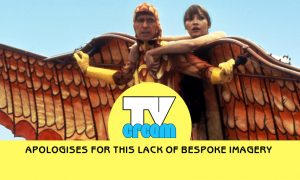Unlike your Chaplins, Keatons, Laurels, Hardys and other bastions of the old school, the Marx Brothers somehow remain constantly underrated. Sure, Groucho’s long been a byword for quips, joke noses and ’80s Soho cubbyholes featuring Julie Burchill shouting obscenities at Stephen Fry, everyone knows the Night at the Opera contract sequence, and Duck Soup is shoved into ‘best of’ lists for the right reasons as well as the wrong (ie because it’s ‘still relevant’ as a ‘satire’ – no need to explain why!). But other than that, people, when they bother at all, just can’t stop getting them wrong. They were rubbish apart from Groucho. There were only a couple of decent scenes per film. Their comedy looks embarrassingly out of date alongside dynamic modern stuff like According to Bex. The wronger they are, the louder they get. God forbid we should attempt to lay down the law on this one, but a few pointers on why one of their less-heralded films is utterly wonderful in every respect shouldn’t go amiss this season, surely?
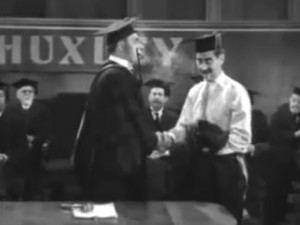 |
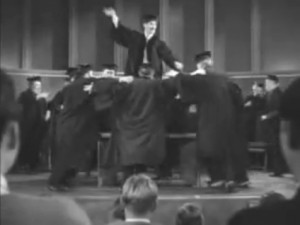 |
The first thing that strikes you about Horse Feathers is what they haven’t bothered with. In their first film, the unexcitingly titled The Cocoanuts, the brothers played what comics were traditionally reduced to – the comic relief. Despite it nominally being their show, they’re only to the fore as much as the half-baked jewel thief plot, chorus lines and feeble romantic interludes will allow. And when they do get the stage, they sound nervous, uneasy and, a lot of the time, almost inaudible. Three films later however, they finally get the upper hand. In fact, it’s gone completely in the other direction. At least Monkey Business had a ship’s captain and a gangster for the brothers to run rings around. Here no-one in authority gets more than a snout round the door. Stiff and starchy professors dance about to Groucho’s ace double song, Connie Bailey’s fancy man disappears as soon as he’s become properly threatening, and the two footballing heavies Harpo and Chico are sent to kidnap are never going to keep the pair detained for long when they can pull the old ‘sawing a hole in the floor’ routine not once, but twice.
Lapel-grasping dullards claim this as a weakness. Comedy needs a bedrock of reality, they say, an emotional truth that allows you to identify with the characters. Great comedy comes not from gag after gag, but something deeper, from within the shared experience of every… But by this time either you’ve fallen asleep or they have. It all sounds good and worthy. It sounds like it’s Taking Comedy Seriously and respecting it as an artform and all that tackle. But it isn’t, it’s just loading comedy with creaky old formal rules it doesn’t need. Scholars and reviewers like to do this, to bring comedy into their easily manageable realm, in the same way journalists have their biographical ’emotional fuck-up’ rule for great comedians. A load of Poldark, all of it, and Horse Feathers is demonstration enough of the inherent uselessness of all this greasy Lawsonian postulation.
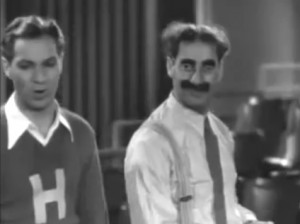 |
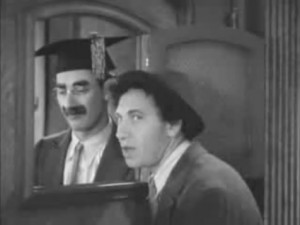 |
Between the adoption of sound in the ’20s and the rise of screwball comedy in the late ’30s, American funny films were, with the notable exception of the great silent age survivors, not that funny. Freshly liberated from playing five shows a day, music hall artists crowded onto sound stages to string together half a dozen sketches in eerily audience-free revues, but although the likes of Wheeler and Woolsey, Jack Oakie and Eddie Cantor could adapt a bit further to a sort-of narrative film, the stuff they turned out fails to preserve the whateveritwas that made them big on the Pantages Time and all those arcane vaudeville circuits spoken of in hushed tones by playbill-hoarding archivists on well-meaning but tackily produced AFI tribute specials. They played fish out of water in the desultory plots they were given, but the same was true in reality, and as the studios owned the pond, they had the bigger say in what went on. Not so the Marxes, who, under the aegis of their formidable mum, had built up a repertoire of ‘legitimate’ musical comedies, which were not only considered ‘classier’ by theatrical snobs (including said mum), but also gave the O-Boys the upper hand when they arrived on set with a full-length film almost complete. From Animal Crackers on, Paramount was working increasingly on their terms.
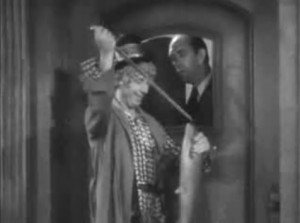 |
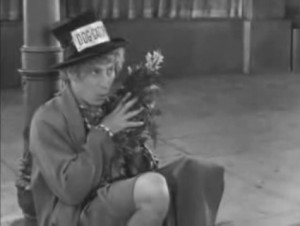 |
It’s a testament to this unique state of affairs that you have to keep reminding yourself Horse Feathers is three quarters of a century old. Technical quality, period references and costumes aside, it keeps failing to participate in that seldom-explained process critics call ‘dating’. It’s not as if these films were made with an eye on posterity after all – two months in theatres and down the hatch, as far as anyone was concerned. Nowadays films are made to a five-year plan involving worldwide syndication, TV and DVD rights, pens, mugs, first option on ‘knowing’ reference to key scene in Shrek IV et al, and yet your average Will Ferrell vehicle seems tired and old-fashioned before the opening credits have run their course. Making comedy, like cycling to High Wycombe, is not something that benefits much from constant anxious glances over the shoulder.
Some say all comedy pre-His Girl Friday is creaky and ponderous by today’s yardstick. With all due respect to that fantastic film, bollocks. Horse Feathers has little more than an hour to make its mark, so no time is wasted. The set-up is high concept indeed – Groucho is the incoming president of a college. A lesser, newer comedy would have a lengthy, tiresomely logical preamble explaining how this unlikely event came to pass, perhaps with a tedious montage sequence, and maybe the odd joke if anyone round the table remembers. Not so here – Groucho’s giving his inaugural address within a minute of that cartoon horse naffing off, slagging off the college, slagging off Zeppo, singing two songs, holding a mock auction, dancing about and even finding time to cram in a plot point.
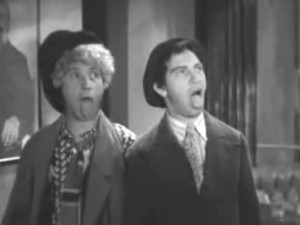 |
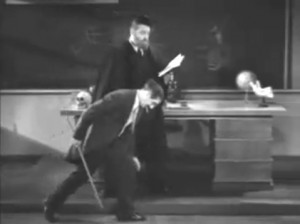 |
This last is obviously the least important, and indeed by the middle of the next scene (the famous speakeasy sketch) it’s all but forgotten. The speakeasy bit has the best and worst of the boys, and it shows rather neatly
how the dreary world of early ’30s romantic comedy is given short shrift by each brother in turn. While Groucho mugs to camera and confuses and insults anyone who dares play it remotely straight, and Chico takes the stereotyped ‘idiot/immigrant’ role and carries it so far off into the realms of oblique dimness he starts to look almost bright, Harpo blunders effortlessly in and out as if he were part of some silent film from a decade ago the projectionist spliced into this picture by accident. This goes double for the ‘wooing of Connie Bailey’ scene, where Groucho, Chico, Zeppo and straight blokey walk in and out of doors, sit on and off laps, play the
piano, take the piss out of the piano-playing bit etc., while Harpo just repeatedly walks through the room with a lump of ice and lobs it out the window. Blowsy oafs who subscribe to the ‘Groucho was the only funny one’ canard need to watch these scenes on waking every day until they get a bit cleverer.
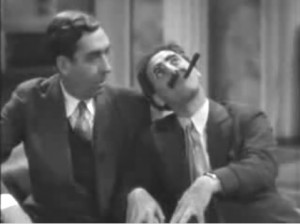 |
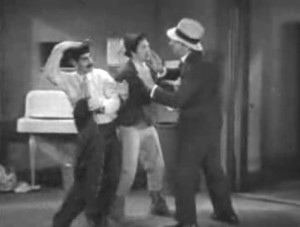 |
This winning spirit – Groucho attacking the film with ahead-of-his-time cynicism, Harpo gleefully running rings around it in antiquated silence, Chico proudly refusing to understand any of it – is infectious enough to let them get away with murder. And they do. Even when the gags are neither funny nor timeless, somehow you can’t quite bring yourself to care. The ‘swordfish’ password routine is one of the most quoted bits of verbal business in cinema history, yet it’s full of eye-rolling rubbish – the sturgeon/surgeon line, for instance, and the exchange – “What do you take for a haddock?” “Sometimes aspirin, sometimes I take-a Calomel.” “Say, I’d walk a mile for a Calomel!” “You mean chocolate Calomel!” A bit of gerontological digging reveals Calomel was a vomit-inducing medicine made from mercury, and “I’d walk a mile for a Camel” was a fag ad slogan. Neither have seen much action since the war. So there you have an exchange that needs to be comprehensively researched before it can even be dismissed as unfunny, yet still no-one’s put off the sketch in the slightest. This is robust stuff!
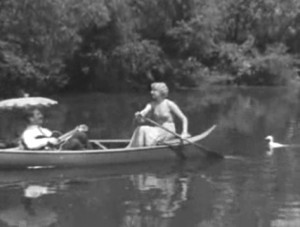 |
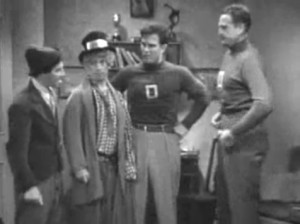 |
It’s also threadbare. The endless tours and rewrites that would mark the best of the MGM pictures weren’t in Paramount’s budget. Sets were hastily improvised or nicked from other productions, and the cameramen were never allowed enough time to work out where Groucho and co were going to be next, hence all the aimless pans and weird cut-offs. Scenes fade out without a decent punchline, and sometimes with no punchline at all. The film was meant to end with a set-piece fire destroying the college, but in the end we just fade out from the ballgame to a throwaway gag wherein Connie ends up marrying all the Marx brothers at once (except Zeppo, the only one who was seriously interested in her, natch). And, as no-one’s ever bothered to restore the thing properly, the action chops and jerks in places like a four-year-old rented print of Clash of the Titans at an end-of-term film show. This should matter. But, again, it doesn’t. The pin-sharp lighting and ballooning budgets of the MGM pictures may not have hindered the brothers (initially, at least) but there’s no evidence either here or there to suggest it helped in any way.
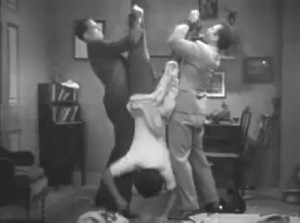 |
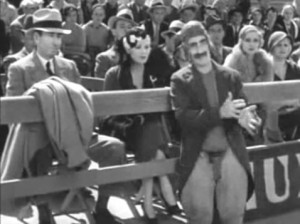 |
The lesson to take from all of this sounds like a rather wet moral from an episode of Hey Arnold! written down, namely that a comedy film needs total self-assurance and zero self-consciousness in order for it to even begin pointing in the general direction of being any good at all. If we could make ourselves heard over the sound of the Earth failing to shatter at that revelation, we’d go on to add that this really is the only rule worth bothering with. While ‘discipline’ is obviously necessary for writing comedy (as if it’s unnecessary for doing anything properly) it has to come from that proper starting point, not a bunch of goat-sired tittle-tattle masquerading as stone-carved commandments.
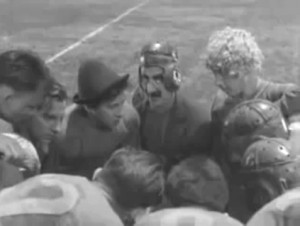 |
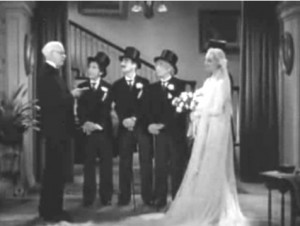 |
When John Cleese started taking scriptwriting classes in order to give A Fish Called Wanda ‘the proper structure’ it was by no means a foregone conclusion that the resulting screenplay would be at least 50{30e2395aaf6397fd02d2c79d91a1fe7cbb73158454674890018aee9c53a0cb96} pain-in-the-arse mechanical plotmongery, but the odds against it lengthened considerably. It was a fatal mistake to put the narrative cart before the horseplay – if Fawlty Towers wasn’t crammed with high-grade tomfoolery, no-one would bother cooing over its elaborately constructed plots today. Still, the usefulness of Horse Feathers as an educational tool for comic lubbers is its least important virtue. It’s first and foremost a prime example of unabashed, undiluted, concentrated comedy, and it hardly needs recommendation from us to ensure its immortality. But anyway, how good is Horse Feathers? Well, very very indeed, thanks.




